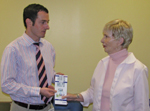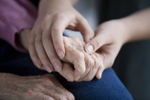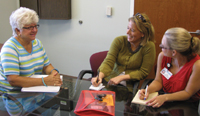By
Dawn Brazell
Public Relations
It takes
courage to hand a psychiatrist a
brochure that describes how he can
improve the care he provides for
his patients with mental illness.
Yancey Wise, a
retired psychotherapist, does just
that, though, and with good
success. David Beckert, M.D.,
Department of Psychiatry and
Behavioral Sciences, Institute of
Psychiatry (IOP) takes the "What
Hurts, What Helps" brochure and
praises her efforts.
 Dr. David Beckert
and Yancey Wise discuss how
switching to patient and
family-centered care can improve
the quaity of health care. Dr. David Beckert
and Yancey Wise discuss how
switching to patient and
family-centered care can improve
the quaity of health care.
Beckert said
there are many in his field who
can benefit from this type of
material and the reminder to not
forget or minimize the role that
family can play in a patient's
recovery. "It goes back to the
mission of what we do."
For Wise, it
gets to the heart of MUSC's
latest push aimed at redefining
the relationships in health
care. Wise is a member of the
new IOP Patient Family
Partnership Council. It is one
of two new patient-family
partnership councils, one formed
for IOP in April and another for
the medical center last month.
Torri
Jacobsen, coordinator of MUSC
Patient and Family-Centered
Care, said IOP has its own
council separate from the
medical center council because
of its unique patient population
that is underserved. "I have a
passion for it. I've personally
seen what it's like for someone
to struggle with mental illness
and addiction, and I've felt the
impact. The most fulfilling part
of my job is the work I get to
do with this council. I love
it."
Patient and
family-centered care is not new.
Other hospitals have adopted it
with amazing results including
increased patient satisfaction,
decreased medical errors and
improved communication, she
said, adding that it's a way to
take MUSC's excellence program
to the next level.
 "Patient and
family-centered care focuses on
what works for the individual.
If patient and family members
are actively involved with their
care throughout the whole
process, then there's better
care and compliance when a
patient gets discharged because
it's a partnership, and everyone
is on the same page. It's
breaking down the hierarchy of
'I'm the doctor or nurse, and
here are the answers.' It's
understanding this should be a
conversation with our patients
and families, not a one-way
discussion. We need to have an
open dialogue and share
information freely to achieve
patient-centeredness." "Patient and
family-centered care focuses on
what works for the individual.
If patient and family members
are actively involved with their
care throughout the whole
process, then there's better
care and compliance when a
patient gets discharged because
it's a partnership, and everyone
is on the same page. It's
breaking down the hierarchy of
'I'm the doctor or nurse, and
here are the answers.' It's
understanding this should be a
conversation with our patients
and families, not a one-way
discussion. We need to have an
open dialogue and share
information freely to achieve
patient-centeredness."
Admitting it's
an ambitious project to achieve
such a cultural shift hospitalwide,
Jacobsen said the research
supports that this is the right
thing to do. It's a win-win for
staff and patients. "The council
is called a partnership council
because we want them to be true
partners working side-by-side
with our leadership, our
clinicians, and our staff.
They'll be working on strategic
initiatives that will help
support our cultural shift
towards patient and family
centered care."
Though the IOP council just
started meeting in April, it
already has made important
contributions. "It's amazing
what great ideas they have come
up with in such a short amount
of time. I feel very fortunate
to serve as the council liaison
to such an outstanding group."
Those ideas
include: initiating plans for a
weekly spiritual support group
for interested patients;
providing copies of "What Hurts,
What Helps" by The National
Alliance for Mental Illness
(NAMI) to MUSC health providers
and staff; setting up crisis
intervention training for
emergency department and medical
center security staff about how
mental health issues present and
how best to help these patients;
and planning question-and-answer
panels on mental health issues
that include the perspectives of
patients, family members and
professionals.
Providing the
trainings and discussion
sessions has the potential to
dramatically affect care, she
said. If staff members better
understand how mental illness
presents and that it is an
actual illness and not just the
patient being difficult, it
changes the way patients and
families are treated, and also
provides much needed support to
the hospital staff.
"The council
thought if we can in any way
help support hospital staff by
helping to better manage their
anxieties and fears, then we can
help break down the walls and
stigmas that surround mental
illness."
Jacobsen, who still is
recruiting members for both
councils, said she's been
incredibly lucky in who's
volunteering for the job. The
IOP council members are willing
to use their own stories to put
a human face on mental illness
and to share what has and hasn't
worked for them in hopes of
easing the suffering of others
with mental illness.
They are
people such as Wise, who also
leads a NAMI support group. The
retired psychotherapist hit a
wall in 1972 and found herself
in the patient's chair with a
diagnosis of major depression,
and then in 1982 received a
diagnosis of bipolar disorder.
Wise said she struggled through
a dark period where she felt she
lost hope and her confidence was
shattered. She had to quit
working. Mental illness took
over her life, her career and
her dreams. She was hospitalized
four times before she found a
way to take back her life.
"The last 12
years, I've been in recovery.
Now I have a chance to give to
those with mental illness – to
give people hope. For years I
didn't have much hope," she
said. "It is possible to lead a
productive life."
Also on the
IOP council is Marian
Rzepkowski, a retired teacher,
who uses her talents to lead a
NAMI support group and co-teach
the NAMI Family-to-Family
Program, a free 12-week course
for family caregivers of
individuals with mental illness.
An outspoken advocate,
Rzepkowski knows the strains
placed on caregivers, and
teaches the class because she's
seen it change people's lives.
The council is another way to
extend her advocacy work.
"It is my
passion. I have a 38-year-old
daughter who has suffered from
mental illness since her teens.
She has been married five times
and lost custody of five
children. I want everyone to
understand mental illness. It's
not because of some parental
issue. In most cases, it's
because of some brain issue that
has happened. I want to do
something to affect their care."
That's true of
council members Lacey Lipe and
her 19-year-old son, who has
bipolar disorder and is on the
autism spectrum. Lipe has
learned the hard way what
medical providers can do to
better help those with mental
illness, and the heavy toll that
state budget cuts on mental
health programs is having on
families. She wants to get out
the story of what a difference
it can make to get patients with
mental illness timely treatment
and the right family support.
Marian
Rzepkowski, left, Lacey Lipe,
center, and Torri Jacobsen
discuss council plans. 
Her son, who
at one point had to be admitted
into an inpatient facility, has
made great progress in getting
to a point where he can be an
advocate. "He's been through a
lot, and even though I'm an
aggressive go-getter mom, even I
have had a hard time getting him
the help he's needed," she said.
"I think his voice is important
as a young person who is willing
to speak out about it. He's
young, he's 19, and he will
bring a unique perspective. He's
living it right now. He's
dealing with it. He's articulate
and outspoken. He's a very big
advocate for mental illness."
One of her
hopes for the council is that it
will bring hope to the parents
and children who are getting
lost in the system.
"I would like
to be part of a change. To hear
that MUSC is reaching out to the
community and the families
saying 'we want to be a
different kind of hospital'
makes me feel like we can be
part of a change. Clearly, there
needs to be a change in the way
mental illness is viewed and
treated."
To learn more
about the Patient Family
Partnership Councils, visit
http://mcintranet.musc.edu/cceps/PFCC/index
or email jacobsen@musc.edu.
For
information on the Institute of
Psychiatry, visit http://www.musc.edu/psychiatry.
|



 Dr. David Beckert
and Yancey Wise discuss how
switching to patient and
family-centered care can improve
the quaity of health care.
Dr. David Beckert
and Yancey Wise discuss how
switching to patient and
family-centered care can improve
the quaity of health care. "Patient and
family-centered care focuses on
what works for the individual.
If patient and family members
are actively involved with their
care throughout the whole
process, then there's better
care and compliance when a
patient gets discharged because
it's a partnership, and everyone
is on the same page. It's
breaking down the hierarchy of
'I'm the doctor or nurse, and
here are the answers.' It's
understanding this should be a
conversation with our patients
and families, not a one-way
discussion. We need to have an
open dialogue and share
information freely to achieve
patient-centeredness."
"Patient and
family-centered care focuses on
what works for the individual.
If patient and family members
are actively involved with their
care throughout the whole
process, then there's better
care and compliance when a
patient gets discharged because
it's a partnership, and everyone
is on the same page. It's
breaking down the hierarchy of
'I'm the doctor or nurse, and
here are the answers.' It's
understanding this should be a
conversation with our patients
and families, not a one-way
discussion. We need to have an
open dialogue and share
information freely to achieve
patient-centeredness."